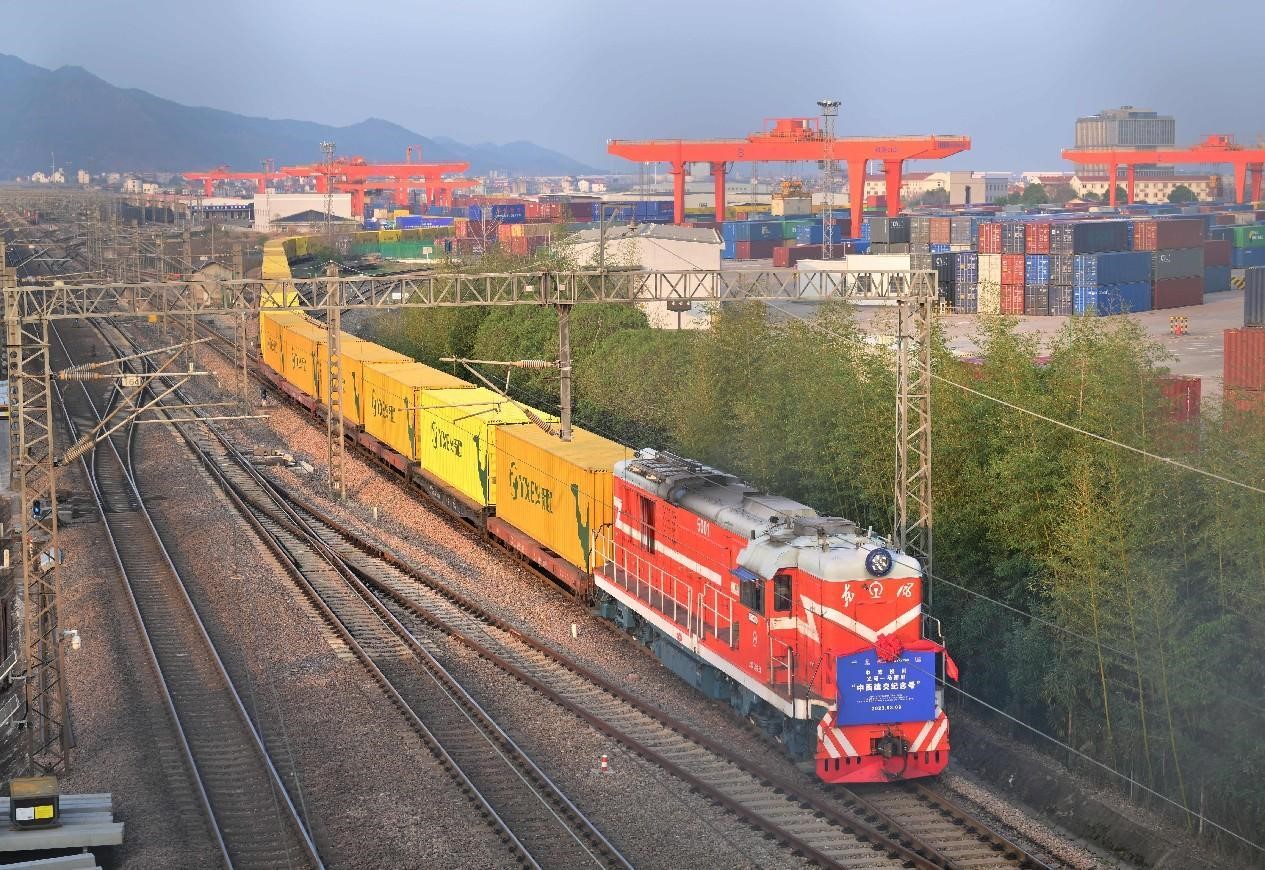By Li Xinping

A fully-loaded China-Europe freight train departs from Yiwu, east China's Zhejiang province, for the capital of Spain, March 9, 2023. (People's Daily Online/Lyu Bin)
China-Europe freight trains made 4,186 trips and transported 449,000 twenty-foot equivalent units (TEUs) of goods in the first quarter this year, up 15 percent and 28 percent year on year, respectively, according to statistics released by China State Railway Group Co., Ltd., or China Railway, on April 10.
In particular, 1,488 trips were made and 162,000 TEUs were transported in March alone, growing 31 percent and 52 percent respectively from a year ago. It marked the 35th straight month since May 2020 that China-Europe freight train trips exceeded 1,000.
On the morning of March 24, a freight train loaded with automobile parts and other cargo departed from Wuhan, central China's Hubei province. It was the first China-Europe freight train heading for Zhodzina, Belarus from Wuhan, and the third new route for the cargo service opened in the city this year.
So far, the transportation channel in the central Chinese city has 44 stable cross-border routes involving 109 cities in 40 countries on the Eurasian continent.
Since this year, a number of Chinese cities have launched new routes or stations for the China-Europe freight train service, including Beijing, north China's Tianjin municipality, Anyang of central China's Henan province and Zhongshan of south China's Guangdong province. The cargo service has constantly expanded its transportation network with increasing channels.
Besides, upgraded services also enriched the sources of cargo and clients for China-Europe freight trains. In particular, the seamless connection between the land-based "Silk Road Economic Belt" and the oceangoing "21st-century Maritime Silk Road" has opened up new prospects for rail-sea intermodal train services.
Recently, a cargo vessel from the Port of Ho Chi Minh City, Vietnam arrived at the Haitian Container Terminal at Xiamen Port, southeast China's Fujian province. After fast transit formalities, cargo on the vessel was soon transferred to a China-Europe freight train bound for Almaty, Kazakhstan.

Containers to be shipped by China-Europe freight trains are piled in a container yard in Jinhua, east China's Zhejiang province. (People's Daily Online/Hu Xiaofei)
According to an employee of the China Railway Nanchang Group in east China's Jiangxi province, the rail-sea intermodal train services could shorten the cargo transportation to only 20 days, which is 45 days less time than whole sea transportation. It has become the best logistics route between Southeast Asia and Central Asia, the employee added.
In the future, Xiamen's China-Europe freight train service will promote cross-border LCL (Less than Container Load) business, selecting the fastest shipping schedule to gather bulk cargo from South Korea, Japan and Southeast Asian countries to Xiamen, and then transfer them to Europe through railway, the employee said.
The constant upgrading of infrastructure and relevant services has significantly improved the efficiency of China-Europe freight trains.
Xi'an International Port in northwest China's Shaanxi province, a departure station and return destination of China-Europe freight trains in Xi'an, has expanded its handling capacity by 30 percent after three rounds of upgrading.
The China Railway Beijing Group has opened two cargo routes in a China-Europe freight train base in Shijiazhuang, north China's Hebei province, which improves loading capacity by 50 percent.
In Wuhan, the customs department and the railway department are sharing logistics data of the China-Europe freight train service, which reduces the time for customs clearance by one to two days.
Today, the types of cargo transported by China-Europe freight trains have been significantly expanded, including automobiles, wood, furniture, chemical products, machinery, fertilizers and others.

A cargo train departs from Pinggu district, Beijing, March 16, 2023, marking the launch of the first direct China-Europe freight train service from the Chinese capital. (People's Daily Online/Sun Lijun)
On the morning of April, 8, a China-Europe freight train carrying new energy vehicles (NEVs) departed from southwest China's Chongqing municipality. These vehicles were expected to head for Duisburg, Germany via Alashankou Port in northwest China's Xinjiang Uygur autonomous region.
Thanks to the prospering development of the NEV sector in China, the type of vehicles is driving the cargo volume of China-Europe freight trains. "China-Europe freight trains have become a new choice for Chinese automakers like Geely and BYD to export their products," said an employee of the Xi'an International Port, which has launched a service for whole-vehicle exports.
According to the China Railway Zhengzhou Group in Henan province, the group has launched customized reinforcement plans for different vehicle models during shipping. Each container is able to carry up to four vehicles at most, which has largely reduced the logistics cost for auto exporters.
The continuous recovery of China's macro economy has helped many cities set new records in the China-Europe freight train service.
In the first quarter of this year, Xi'an saw over 1,100 China-Europe freight train trips, which carried more than 1 million tons of cargo, up 39.6 percent and 66.1 percent year on year, respectively.
During the same period, 315 trips departed from Wuhan, delivering nearly 26,000 TEUs. The two figures surged 202.88 percent and 202.8 percent respectively from a year ago.
Also in the same quarter, Hefei in east China's Anhui province set up 21 new stations for the cargo service. A total of 340 China-Europe freight train trips were made by the city, up 49.78 percent year on year.
编辑:袁筱